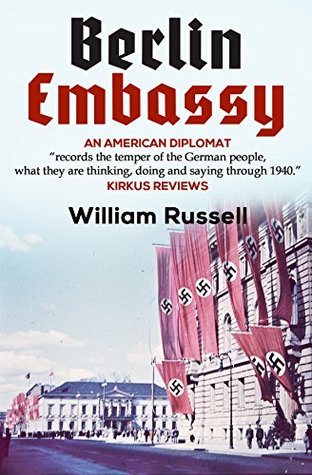More on this book
Kindle Notes & Highlights
In spite of all the discomfort of traveling in wartime Germany, I was glad that I had been chosen to make a courier trip. It gave one a chance to get out of Berlin for a week or two; one visited other consulates and got the views of men stationed all over Germany and one saw for himself what was actually going on.
After they had arrived at the Danish capital, tired, broke and discouraged, to their dismay they received telegrams from the Embassy stating that they had been fired effective as of the day of their departure from Berlin.
The train gathered speed slowly as it rolled through Berlin’s snow-covered suburbs. I noticed that the air was becoming chillier. Quickly suspicious, I reached over and touched the heating apparatus; it was dead cold. The engineer had shut the steam off the moment the train had left Anhalter Bahnhof, to save coal.
I glanced at my watch. Only three hours had gone by. My hands were numb from the cold, and I was hungry. I thought of a dining car, and almost laughed out loud because the idea seemed so absurd. When I pulled a bar of American chocolate out of my pocket and unwrapped the silver wrapping, an electric shock ran through the vestibule. The other passengers eyed my chocolate openly and hungrily. I felt suddenly embarrassed. There wasn’t enough to pass around, so I slid the rest of the bar back into my overcoat pocket.
Time passed. The soldiers and the girls had exchanged addresses with each other — a custom so common in Germany that by now I think every German should have every other German’s address.
A vender of bottled drinks pushed his wagon to the train windows, but he could not sell anything because the contents of his bottles were frozen solid.
“To the best hotel you’ve got in Munich,” I said, recklessly. The hotel to which he took me was full of Munich citizens who had rented rooms because they had no coal or hot water at their homes. I engaged a room, and was taken upstairs in a typical rickety European elevator.
The consul general told me that the food situation in Bavaria was far better than in Berlin; vegetables were plentiful and even eggs were to be had. However, all fats, mainly oils and butter, were extremely scarce.
I myself later saw several military trains in the Munich Station which had large signs painted in chalk on their sides: “FAST TRAIN — WARSAW, PARIS, LONDON,” one sign read. “GOING IN THE DIRECTION OF OUR PROTECTORATE FRANCE,” another stated.
Even the Nazis have not ruined Munich. Now you know how nice the city is.
Vienna was the saddest place I visited. The city was dead, a shell of the once gay city which was the envy of postwar Europe. There is nothing so melancholy as a dead city which is still inhabited by people.
When former King Carol of Rumania visited him at Obersalzburg, Adolf Hitler drank a cultivated tea with his guest, and spoke comparatively little — for the simple reason that Bong Carol answered all of Hitler’s high-flown statements with surprising cleverness. When King Carol had left, as the royal automobile drove down the long winding road of Obersalzburg, Hitler looked after the departing guest, rubbed his hands together in pleasure and astonishment, and said to his attendants: “There goes a very clever rascal.”
When Schreck died, it took the most powerful arguments and persuasion to restrain Adolf Hitler from honoring his faithful chauffeur with a State Funeral.
One of the men who knew best how to dissuade Hitler from carrying out this grotesque State Funeral for a chauffeur was the Fuehrer’s last remaining “du” friend, and certainly one of the most remarkable figures in the leadership of the Third Reich: Heinrich Hoffmann, Germany’s only official photographer.
Since he was of course not noticed by the real society of Munich, he also wants to revenge himself on the Wittelsbachers, the royal family who made the Bavarian capital such a charming one. This is perhaps the reason why Hitler did not make Munich the capital city of the Third Reich, as he had originally intended to do.
I like the way German families walk on Sundays; walk slowly and enjoy their walking — while in America every member of the family must have his own car if the Sabbath air is not to be rent with family squabbles.
The former country of thinkers became known as a land infested with political, moral and intellectual degenerates. For those who liked the land of Germany, who admired its physical beauty, its orderliness and its genuine culture, this change was saddening.
Therefore, on April 13, 1940, I said good-by to a flock of people — Americans, Germans, Nazis, anti-Nazis, rich, poor, intellectuals, bums — whom I had more or less collected over a period of three years.
In a newly acquired miniature car I putt-putted down the Reich Autobahn in the direction of the Brenner Pass — in the direction of Genoa and freedom.
Late in the afternoon, I reached the (former) German-Italian border. I met with politeness there, none of my baggage was examined, none of my papers unfolded. The border patrol had obviously been informed that I was on my way.
When the Italian officials had finished searching me, stamping me and loading me down with travel literature, I looked back at the white mountains of Germany beyond which lay Munich and Berlin and three years of my life. On the whole, they were an agreeable and certainly an exciting three.
The middle-aged man finished his beer and took a deep breath. “I’ll tell you, mister,” he resumed, “what this country needs is. . . .”


